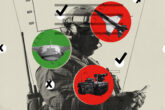November 25, 2019
Russia’s AI Quest is State-Driven — Even More than China’s. Can It Work?
More than Western governments and even more than China’s, the Russian government is trying to position itself as a facilitator of innovation in artificial intelligence, the technology that Vladimir Putin said will lead whoever masters it to global advantage. Russia seeks “to go our own way,” said Prime Minister Dmitry Medvedev, borrowing Lenin’s 1917 words about various anti-capitalist ideologies to describe his government’s 21st-century attempt to shake the world.
Those who doubt that this uniquely state-heavy approach can succeed would do well to remember that today’s internet and mobile telecommunications grew out of Pentagon-funded research, that the Soviet Union led the Space Race for a decade, and that U.S. astronauts currently ascend to orbit atop Russian rockets.
Read the full article in Defense One.
Learn more about the Artificial Intelligence and International Stability Project:

Artificial Intelligence and International Stability Project
Despite calls from prominent scientists to avoid militarizing AI, nation-states are already using AI and machine-learning tools for national security purposes. AI has the pote...
Read MoreMore from CNAS
-
Technology & National Security
Promethean RivalryExecutive Summary Just as nuclear weapons revolutionized 20th-century geopolitics, artificial intelligence (AI) is primed to transform 21st-century power dynamics—with world l...
By Bill Drexel
-
Defense / Technology & National Security
Safe and EffectiveThe promise of artificial intelligence (AI) and autonomy to change the character of war inches closer to reality...
By Josh Wallin
-
Technology & National Security
Catalyzing CrisisThe arrival of ChatGPT in November 2022 initiated both great excitement and fear around the world about the potential and risks of artificial intelligence (AI). In response, s...
By Bill Drexel & Caleb Withers
-
Technology & National Security
Obstacles and Opportunities for Transformative ChangeWatch:...
By Paul Scharre




